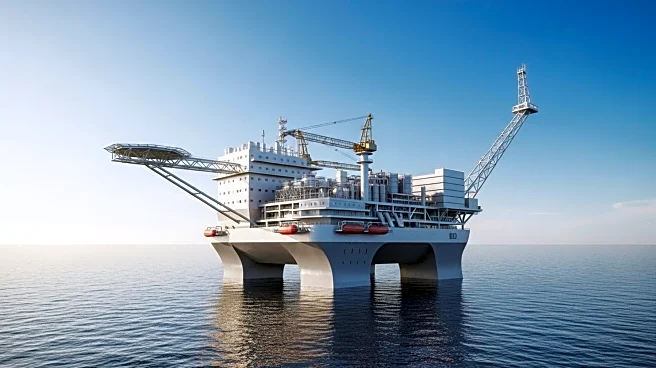What's Happening?
Seatrium has secured Approval in Principle (AiP) from the American Bureau of Shipping (ABS) for its innovative FLEXHull 1500K-M floating production storage and offloading (FPSO) design. This approval highlights Seatrium's capability to deliver advanced solutions for deepwater oil and gas production. The FLEXHull 1500K-M is engineered to handle topside loads of up to 80,000 metric tons and features a hull adaptable to various requirements. It includes expanded tank capacity, flexible mooring systems, and can operate in waters as deep as 2,500 meters. The unit is capable of processing 120,000 barrels of oil per day and storing over 1.5 million barrels of oil, with a service life of 25 years. It meets standards set by the International Maritime Organization (IMO), MARPOL, and ABS, and is intended for use in challenging offshore environments, such as those found offshore Brazil.
Why It's Important?
The approval of Seatrium's FPSO design by ABS is significant for the offshore oil and gas industry, particularly in deepwater regions. This development could enhance production capabilities and operational efficiency in challenging environments, potentially leading to increased oil and gas output. The design's adaptability and compliance with international standards may attract interest from global operators seeking reliable and sustainable solutions for offshore production. Additionally, the ability to operate in deepwater regions like offshore Brazil could open new opportunities for exploration and production in untapped areas, contributing to the global energy supply.
What's Next?
With the ABS approval, Seatrium may proceed with further development and deployment of the FLEXHull 1500K-M FPSO design. This could involve partnerships with oil and gas companies operating in deepwater regions, particularly those looking to expand their production capabilities. The industry may see increased investment in similar technologies that offer flexibility and compliance with international standards. Stakeholders, including oil companies and regulatory bodies, will likely monitor the deployment and performance of this FPSO design to assess its impact on offshore production and environmental sustainability.









